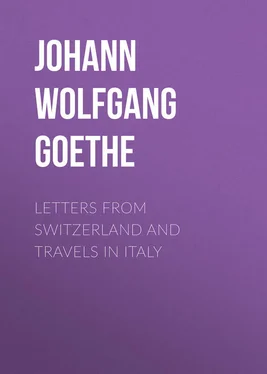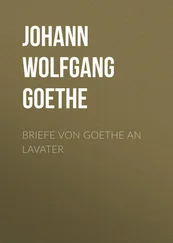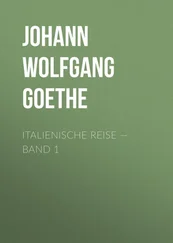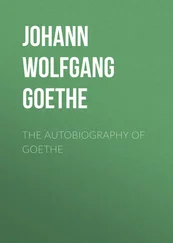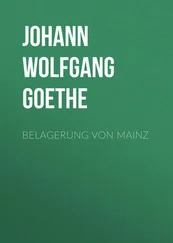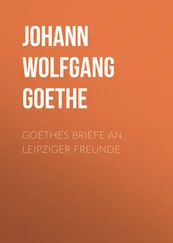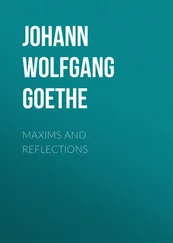Johann von Goethe - Letters from Switzerland and Travels in Italy
Здесь есть возможность читать онлайн «Johann von Goethe - Letters from Switzerland and Travels in Italy» — ознакомительный отрывок электронной книги совершенно бесплатно, а после прочтения отрывка купить полную версию. В некоторых случаях можно слушать аудио, скачать через торрент в формате fb2 и присутствует краткое содержание. Жанр: foreign_antique, foreign_prose, на английском языке. Описание произведения, (предисловие) а так же отзывы посетителей доступны на портале библиотеки ЛибКат.
- Название:Letters from Switzerland and Travels in Italy
- Автор:
- Жанр:
- Год:неизвестен
- ISBN:нет данных
- Рейтинг книги:4 / 5. Голосов: 1
-
Избранное:Добавить в избранное
- Отзывы:
-
Ваша оценка:
- 80
- 1
- 2
- 3
- 4
- 5
Letters from Switzerland and Travels in Italy: краткое содержание, описание и аннотация
Предлагаем к чтению аннотацию, описание, краткое содержание или предисловие (зависит от того, что написал сам автор книги «Letters from Switzerland and Travels in Italy»). Если вы не нашли необходимую информацию о книге — напишите в комментариях, мы постараемся отыскать её.
Letters from Switzerland and Travels in Italy — читать онлайн ознакомительный отрывок
Ниже представлен текст книги, разбитый по страницам. Система сохранения места последней прочитанной страницы, позволяет с удобством читать онлайн бесплатно книгу «Letters from Switzerland and Travels in Italy», без необходимости каждый раз заново искать на чём Вы остановились. Поставьте закладку, и сможете в любой момент перейти на страницу, на которой закончили чтение.
Интервал:
Закладка:
Before us we saw a fruitful and populous plain. The spot on which we were standing was a high, bare mountain rock, which, however, produces a sort of grass as food for the cattle, which are here a great source of gain. This the conceited lord of creation may yet make his own: – but those rocks before his eyes are like a train of holy virgins which the spirit of heaven reserves for itself alone in these inaccessible regions. We tarried awhile, tempting each other in turn to try and discover cities, mountains, and regions, now with the naked eye, now with the telescope, and did not begin to descend till the setting sun gave permission to the mist, – his own parting breath, – to spread itself over the lake.
With sunset we reached the ruins of the fort of S. Cergue. Even when we got down in the valley, our eyes were still rivetted on the mountain glaciers. The furthest of these, lying on our left in Oberland, seemed almost to be melting into a light fiery vapour; those still nearer stood with their sides towards us, still glowing and red; but by degrees they became white, green, and grayish. There was something melancholy in the sight. Like a powerful body over which death is gradually passing from the extremities to the heart, so the whole range gradually paled away as far as Mont Blanc, whose ampler bosom was still covered all over with a deep red blush, and even appeared to us to retain a reddish tint to the very last, – just as when one is watching the death of a dear friend, life still seems to linger, and it is difficult to determine the very moment when the pulse ceases to beat.
This time also we were very loth to depart. We found our horses in S. Cergue; and that nothing might be wanting to our enjoyment, the moon rose and lighted us to Nyon. While on the way, our strained and excited feelings were gradually calmed, and assumed their wonted tone, so that we were able with keen gratification to enjoy, from our inn window, the glorious moonlight which was spread over the lake.
Geneva
At different spots of our travels so much was said of the remarkable character of the glaciers of Savoy, and when we reached Geneva we were told it was becoming more and more the fashion to visit them, that the Count 1 1 The Duke Charles Augustus of Weimar, who travelled under the title of Count of…
was seized with a strange desire to bend our course in that direction, and from Geneva to cross Cluse and Salenche, and enter the valley of Chamouni, and after contemplating its wonderful objects, to go on by Valorsine and Trent into Valais. This route, however, which was the one usually pursued by travellers, was thought dangerous in this season of the year. A visit was therefore paid to M. de Saussure at his country-house, and his advice requested. He assured us that we need not hesitate to take that route; there was no snow as yet on the middle-sized mountains, and if on our road we were attentive to the signs of the weather and the advice of the country-people, who were seldom wrong in their judgment, we might enter upon this journey with perfect safety. Here is the copy of the journal of a day's hard travelling.
Cluse, in Savoy, Nov. 3, 1779.
To-day on departing from Geneva our party divided. The Count with me and a huntsman took the route to Savoy. Friend W. with the horses proceeded through the Pays de Vaud for Valais. In a light four-wheeled cabriolet we proceeded first of all to visit Hüber at his country-seat, – a man out of whom, mind, imagination and imitative tact, oozes at every pore, – one of the very few thorough men we have met with. He saw us well on our way, and then we set off with the lofty snow-capped mountains, which we wished to reach, before our eyes. From the Lake of Geneva the mountain-chains verge towards each other to the point where Bonneville lies, half way between the Mole, a considerable mountain, and the Arve. There we took our dinner. Behind the town the valley closes right in. Although not very broad, it has the Arve flowing gently through it, and is on the southern side well cultivated, and everywhere the soil is put to some profit. From the early morning we had been in fear of its raining some time at least before night, but the clouds gradually quitted the mountains, and dispersed into fleeces, – a sign which has more than once in our experience proved a favourable omen. The air was as warm as it usually is in the beginning of September, and the country we travelled through beautiful. Many of the trees being still green; most of them had assumed a brownish-yellow tint, but only a few were quite bare. The crops were rich and verdant; the mountains caught from the red sunset a rosy hue, blended with violet; and all these rich tints were combined with grand, beautiful, and agreeable forms of the landscape. We talked over much that was good. Towards 5 we came towards Cluse, where the valley closes, and has only one outlet, through which the Arve issues from the mountains, and by which also we propose to enter them to-morrow. We ascended a lofty eminence, and saw beneath us the city, partly built on the slightly inclined side of a rock, but partly on the flat portion of the valley. Our eyes ranged with pleasure over the valley, and sitting on the granite rocks we awaited the coming of night in calm and varied discourse. Towards seven, as we descended, it was not at all colder than it is usually in summer about nine. At a miserable inn (where, however, the people were ready and willing, and by their patois afforded us much amusement) we are now going, about ten o'clock, to bed, intending to set out early to-morrow, before the morning shall dawn.
Salenche, Nov. 4, 1779. Noon.
The cavern of the Col de Balme
Whilst a dinner is being prepared by very willing hands, I will attempt to set down the most remarkable incidents of our yesterday's journey, which commenced with the early morning. With break of day we set out on foot from Cluse, taking the road towards Balme. In the valley the air was agreeably fresh; the moon, in her last quarter, rose bright before the sun, and charmed us with the sight, as being one which we do not often see. Single light vapours rose upwards from all the chasms in the rocks. It seemed as if the morning air were awakening the young spirits, who took pleasure in meeting the sun with expanded bosoms and gilding them in his rays. The upper heaven was perfectly clear; except where now and then a single cloudy streak, which the rising sun lit up, swept lightly across it. Balme is a miserable village, not far from the spot where a rocky gorge runs off from the road. We asked the people to guide us through the cave for which the place is famous. At this they kept looking at one another, till at last one said to a second, "Take you the ladder, I will carry the rope, – come, gentlemen." This strange invitation did not deter us from following then. Our line of descent passed first of all among fallen masses of limestone rock, which by the course of time had been piled up step by step in front of the precipitous wall of rock, and were now overgrown with bushes of hazel and beech. Over these you reach at last the strata of the rock itself, which you have to climb up slowly and painfully by means of the ladder and of the steps cut into the rock, and by help of branches of the nut-trees, which hung over head, or of pieces of rope tied to them. After this you find yourself, to your great satisfaction, in a kind of portal, which has been worn out of the rock by the weather, and overlooks the valley and the village below. We now prepared for entering the cave; lighted our candles and loaded a pistol which we proposed to let off. The cave is a long gallery, mostly level and on one strand; in parts broad enough for two men to walk abreast, in others only passable by one; now high enough to walk upright, then obliging you to stoop, and sometimes even to crawl on hands and feet. Nearly about the middle a cleft runs upwards and forms a sort of a dome. In one corner another goes downwards. We threw several stones down it, and counted slowly from seventeen to nineteen before it reached the bottom, after touching the sides many times, but always with a different echo. On the walls a stalactite forms its various devices; however it is only damp in a very few places, and forms for the most part long drops, and not those rich and rare shapes which are so remarkable in Baumann's cave. We penetrated as far as we could for the water, and as we came out let off our pistol, which shook the cave with a strong but dull echo, so that it boomed round us like a bell. It took us a good quarter of an hour to get out again, and on descending the rocks, we found our carriage and drove onwards. At Staubbachs-Art we saw a beautiful waterfall; neither its height was very great nor its volume very large, and yet it was extremely interesting, for the rocks formed around it, as it were, a circular niche in which, its waters fell, and the pieces of the limestone as they were tumbled one over another formed the most rare and unusual groups.
Читать дальшеИнтервал:
Закладка:
Похожие книги на «Letters from Switzerland and Travels in Italy»
Представляем Вашему вниманию похожие книги на «Letters from Switzerland and Travels in Italy» списком для выбора. Мы отобрали схожую по названию и смыслу литературу в надежде предоставить читателям больше вариантов отыскать новые, интересные, ещё непрочитанные произведения.
Обсуждение, отзывы о книге «Letters from Switzerland and Travels in Italy» и просто собственные мнения читателей. Оставьте ваши комментарии, напишите, что Вы думаете о произведении, его смысле или главных героях. Укажите что конкретно понравилось, а что нет, и почему Вы так считаете.
